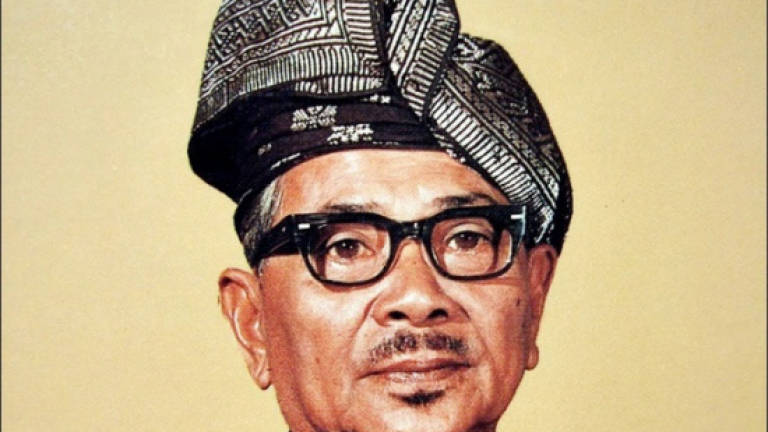Tunku Abdul Rahman honoured with inaugural 'Tokoh Hawana' award

KUALA LUMPUR: The late Tunku Abdul Rahman Putra Al-Haj, the Father of Independence and Father of Malaysia, was today honoured with the inaugural "Tokoh Hawana" National Journalists' Day 2017/18 Award for his contributions and services to developing and promoting journalism and the media in the country as well as his invaluable contributions in the international arena.
The Tunku, as the first prime minister and the first information minister of Malaysia, laid the foundation for the development of the print and electronic media in the country and was active as well in the field of writing. Films were produced from three of his literary works, namely "Mahsuri", "Raja Bersiung" and "Sumpahan Mahsuri".
The "Tokoh Hawana" Award, introduced at the launch today of the National Journalists' Day, was presented by caretaker prime minister Datuk Seri Najib Abdul Razak to Tengku Rozani Tengku Ahmad Nerang, a granddaughter of the Tunku, at the event at the Matrade Exhibition and Convention Centre here.
The Tunku, who took office as the chief minister of the Federation of Malaya in 1955 and was the prime minister of Malaya from 1959 to 1963 and prime minister of Malaysia from 1963 to 1970, was born in Alor Star, Kedah, on Feb 8, 1903, and died on Dec 6, 1990.
As the minister of information and broadcasting from 1961 to 1964, he played an instrumental role in strengthening the position of radio and television as respected broadcasting agencies.
The Tunku realised that the people's support for the government rested on the timely delivery of accurate information through the print, electronic and face-to-face communication channels.
He consolidated the position of Radio Malaya and the morphed Radio Malaysia as a source of news, information and entertainment for the people and also established radio broadcasts in the English Language, Mandarin and Tamil, and set up radio broadcasts in the states.
In the field of print media, the Tunku emphasised the importance of journalism training by establishing the South East Asia Press Centre on Sept 29, 1966, which served as a training institution for cadet journalists from Malaysia and also from the other countries in South East Asia.
In 1974, the South East Press Centre was renamed the Malaysian Press Institute.
The Tunku also played a key role in the establishment of the Malaysian National News Agency via the enactment of the Bernama Act and launched the news agency at Parliament House on Aug 30, 1967.
His interest in the world of journalism remained with him even after he retired as the prime minister. After his appointment as the chairman of The Star Media Group in 1977, he was an active columnist, examining current issues and writing about his experience in politics and government.
Even up to the age of 85, he was actively writing columns such as "Looking Back" and "As I See It" in The Star newspaper.
The Tunku had published his first book in 1969, entitled "May 13, Before and After" which was his personal view of the events that led up to the ethnic riots on that date and the events that followed the incident.
The other books he published include "Viewpoints", "Looking Back", "As a Matter of Interest", "Something to Remember", "Less We Forget", "Contemporary Issues in Malaysian Politics", "Challenging Times" and "Political Awakening".
In the international arena, the Tunku is remembered for having proposed the establishment of the Organisation of Islamic Conference, now known as the Organisation of Islamic Cooperation (OIC). He was appointed the first secretary-general of the organisation.
He also inspired the establishment of the Islamic Development Bank as a specialised institution in the OIC as well as the setting up of the Association of South East Asia (ASA) comprising Malaya, the Philippines and Thailand. — Bernama